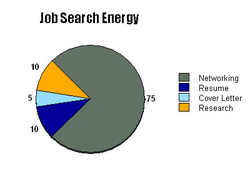 Ever found that dream job, been offered it, only to turn it down because it doesn't pay enough? Was the thought that followed: If only it wasn't for that student loan payment? You aren't alone. Thanks to activist groups such as Student Debt Crisis and The Project on Student Debt, this issue is getting attention in mainstream media. An internet search today for “student loan debt” news provided a cross section of articles from sites such as: Time, USA Today, Fortune, and NY Times. The picture they paint? People, highly educated people, who are too overextended to afford a house payment, people who have to move back in with their parents, and people who have worse credit scores than their peers from decades past. I often advise clients to consider taking lower paying jobs to gain experience or higher levels of satisfaction. More and more, they tell me they can’t. And it’s not because they don’t want to give up luxuries; instead, it’s because there aren’t any. That $500 (or more) a month loan payment makes the prospective job pool even narrower. Of course, student loans aren't the only barrier to accepting less income, having children or dealing with medical issues can result in the same financial stranglehold. So what can you do? 1. Make the Most of It: Your vacation time? Use it to recharge. Fight for opportunities to grow and expand your skill set. Apply for promotions. Negotiate for higher pay. Branch out and try new things when the opportunity arises. If opportunities aren't there, strike out and make them. 2. Work out a lower monthly payment while you are at a starting level salary. The payment will increase when your income is projected to increase. This is not a perfect answer, because the interest is growing and there’s no guarantee you’ll be ready for the increase, but it may be worth a shot. See: Income-Based Repayment at the Consumer Financial Protection Bureau. 3. Ready to put your all into paying off the loans, see this post at Forbes: How I Paid Off $90,000 In Debt In Three Years 4. Another possible negotiation: ask the potential (or current) employer for a one-time bonus/payout to use toward your student loan. (A big chunk up front can take years off the loan.) 5. You could also work more. I think the 40 hour work week is too much, so I consider this a last resort, but if can pull this off it will make a difference. You’ll have extra income to put toward your loan(s) and you’ll have less time/energy to spend your money on fun things. (Not really win-win.) Fired Up About Student Loan Debt?
See: Student Debt Crisis You’ll find resources, stats, and petitions. Be a student debt activist! Higher Ed Not Debt There’s an excellent short video and oodles of information. (Need catharsis?) Default: The Student Loan Documentary A 27 minute video that was shown on PBS in 2011. The Project on Student Debt Many fact sheets with information about student loan trends.  The Complicated Graph of Energy Use The Complicated Graph of Energy Use Know one of these people? They hate their jobs, but they aren't looking for a new one. Why? Because, they tell you, there are No Jobs out there! I won't argue the job market isn't suffocatingly difficult these days. But it isn't true that there are no jobs. According to the Job Openings and Labor Turnover Survey (JOLTS) program, we had nearly 4 million job openings in the U.S. this past December (2013). So really--there are jobs! When someone tells you otherwise, tune her out. The most important thing to keep in mind when considering the competition is you must be the most desirable candidate. There are so many ways to do that. The more you do to set yourself apart from other candidates, the more air there is to breathe. Keep reaching for the top. Joey: If you ask me, as long as you got this job, you’ve got nothing pushing you to get another one. You need the fear. |



 RSS Feed
RSS Feed